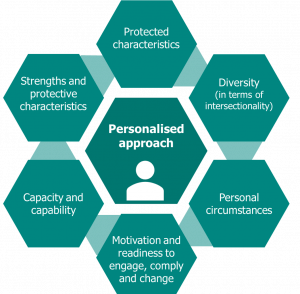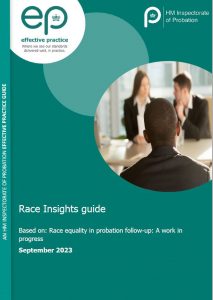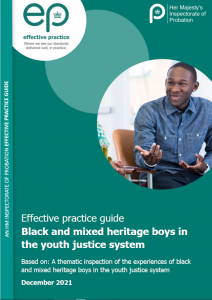Diversity, equality and inclusion
Our standards highlight the importance of taking a personalised approach to working with people on probation and children.

This personalised approach should consider:
- Protected characteristics – recognising the nine protected characteristics (gender, age, race, religion and belief, disability, pregnancy and maternity, sexual identity, gender reassignment, and marriage or civil partnership).
- Diversity in terms of ‘intersectionality’ a term used to explain how different aspects of our identities (for example, gender, race, class, sexuality, ability, physical appearance, height, etc.) combine to create unique advantages, often described as ‘privilege’ or disadvantages, often described as ‘discrimination’. This should include structural barriers which have prevented the child working with youth justice services and the person on probation accessing universal services, such as education or healthcare.
- Personal circumstances – for example: living in a rural area, ability to attend appointments, ETE patterns, immigration status, understanding of English, attachment, speech and language needs, neurodiversity, caring responsibilities, educational difficulties, having grown up in local authority care, past/ongoing trauma, vulnerability to exploitation, level of maturity, family and wider social context and previous experiences with professionals (NB: This is not an exhaustive list).
- Motivation and readiness to engage, comply and change.
- Capacity and capability
- The child’s/person on probation’s strengths and protective factors.
Thus, allowing staff to understand what it is like for that particular child/person on probation, in their specific circumstances and within their specific landscape, so you can understand their lived experience.
Specifically focusing on youth services, if practitioners are able to understand the child’s personal circumstances/diversity needs, this will assist in having a child first approach.
This understanding of context provides a solid basis for establishing a positive working relationship with the child/person on probation for the period of supervision and should serve to positively impact on all elements of the ASPIRE model.
The resources we have developed to date are:
 Effective Practice, Race equality in probation follow-up – A work in progress (September 2023)
Effective Practice, Race equality in probation follow-up – A work in progress (September 2023)
Based on our Race equality in probation follow-up: A work in progress thematic inspection, this guide was designed to help managers and practitioners to reflect on how best to improve the experience of ethnic minority staff and people on probation.
Read the race equality in probation follow-up: A work in progress effective practice guide
Effective Practice guide: Black and mixed heritage boys in the youth justice system (December 2021)
Based on our thematic inspection of the experiences of black and mixed heritage boys in the youth justice system, this guide explains why it is important to consider ethnicity in practice and how practitioners can do this.
Read the black and mixed heritage boys in the youth justice system effective practice guide.
Online Insights 2022 festival event: Black and Mixed Heritage Boys: Principles of Effective Assessment in Youth Justice. (May 2022)
This 59:22min YouTube video provides an overview of the principles of effective assessments for Black and Mixed Heritage boys, we provide some questions for practitioners to reflect on when considering their work in this area, we then hear from Young Hackney about their out-of-court disposals assessments and Lewisham regarding their trauma informed, anti-racist, restorative pre-sentence report approach.
Watch the recording and view the resources from the online event.
 YJB Practitioner Forum: Black and mixed heritage boys in the youth justice system (January 2022)
YJB Practitioner Forum: Black and mixed heritage boys in the youth justice system (January 2022)
This presentation by Tammie Burroughs, Effective Practice Lead, provides an overview of the case supervision section of the black and mixed heritage boys effective practice guide.
Watch the recording and view the resources from the black and mixed heritage boys webinar.
 Towards effective practice with black, Asian and minority ethnic people on probation (May 2021)
Towards effective practice with black, Asian and minority ethnic people on probation (May 2021)
This is a recording of HM Inspectorate of Probation’s event exploring effective practice identified during our thematic inspection of race equality in probation.
Read more about the research which underpins diversity, equality and inclusion here:
Adults
Specific sub-groups (the evidence base – probation services).





